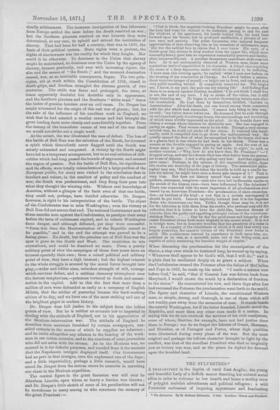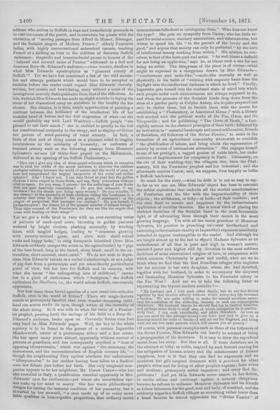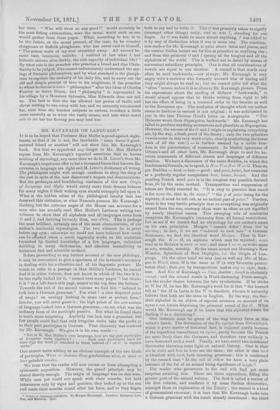THE SYLVESTRES.*
A PUALANSTERY in the depths of rural East Anglia ; the young and beautiful Lady of a Suffolk manor deserting her natural social allies in order to welcome to her hearth and home a motley crew of polyglot socialist adventurers and political refugees ; a wild Fourierist enthusiast of imposing appearance and fascinating * The Syleotras, By 111, Bottum Edwards. 3 vols. London; Ilurat and Bloke=
address who arrives in Suffolk in rags and immediately proceeds to to vieit the curate of the parish, and to entertain his guests with the recitation of "moving passages from Alfred de Mussel, liSranger, and the Socialist singers of Modern France ;" elderly Fourierist ladies, with highly unconventional antecedent careers, teaching French at a shilling an hour to the children of decorous Suffolk radesmen ; rhapsodic and transcendental poes.ns in honour of the 'beloved and revered name of Fourier" addressed to a dull and decorous Bury-St.-Edmund's rtudience,—risson teneatis, dwellers in what Miss Edwards apostrophizes as "pleasant county of Suffolk"? Yet we have but mentioned a few of the wild anoma- lies and strange portents which would have to be accepted as realities before the reader could regard Miss Edwards' cleverly- written, but erratic and bewildering, story without a sense of the incongruous scarcely distinguishable from that of the ridiculous. As itis, we think Miss Edwards has made no slight mistake in laying the scene of her dramatized essay on socialism in the locality she has chosen. She obtains, it is true, ample opportunities of pointing a contrast between the brilliancy of the intellectual life of her socialist band of heroes and the dull stagnation of what—ac she would probably say with Lord Westbury—Suffolk people "are pleased to call their minds ;" she is enabled to gratify to the full her constitutional antipathy to the clergy, and to display ad libitum her powers of word-painting of rural scenery. In fact, a little of that sort of thing comes as a pleasant relief to lengthy lucubrations on the solidarity of humanity, or outbursts of frenzied oratory such as the following passage from Monsieur Sylvestre's sermon (of thirty-four pages) on the Millennium, delivered at the opening of his Suffolk Phalanstery,—
" How can I give any idea of these grand schemes which to conceive was to read the riddle of the moral universe, to discover the sublime analogies existing between the world of nature and the world of man, to hear and comprehend the mighty harmonies of the social and stellar spheres ? Alas! I know not. I can only throw at your foot the golden sheaves I have reaped in those fields, and say, Help yourselves without stint or spare. Do you weep, 0 priests! for the sufferings of your flocks that are past heavenly consolation? Do you feel ashamed, 0 my brothers! for the shame you bring upon women ? Do you tremble, 0 my sisters! at the spectacle of little children toiling like bondsmen in a country that owns no slaves? Do you groan, 0 statesmen I at the plague of pauperism that scourges our oapitale ? Do you bewail, 0 philanthropists ! the dreary lot of the greater number of human beings Then take counsel of the Fourierists, for they are like the angels that come with healing on their wings!"
Yet we got a trifle tired in turn with an ever-recurring series of pictures of meek-eyed cows, browsing in golden pastures watered by bright rivulets, plashing musically, by winding lanes, with tangled hedges, leading to "commons glowing with sweetly-scented gorse, and alive with shrill-voiced rooks and happy larks," to thing farmyards inhabited (here Miss Edwards suddenly merges the artist in the agriculturist) by "pigs of the best breed, long ia the barrel, shiny black, small in the ex- tremities, short-snouted, short-eared." We do not wish to depre- ciate Miss Edwards' talente as a verbal Gainsborough, or as a judge of pig-flesh from a picturesque and yet scientifically porcicultural point of view, but her love for Suffolk and its scenery, with what she terms "the unforgetting love of childhood," carries her to a pitch of enthusiasm which "foreigners," the Suffolk equivalent for gapPapot, i.e., the world minus Suffolk, can scarcely appreciate.
But how came these fervid apostles of a new creed into orthodox Suffolk, even in the world of fiction ? There are magic-lantern scenes so grotesquely fanciful that even wonder-devouring child- hood can scarce credit its eyes, though aware of the unreality of the whole thing. So it was with us when the voice of a Fourier- ist prophet, pouring forth the ravings of his faith to a Bury-St.- Edmund's audience, broke upon us. Certainly, fiction runs fact very hard in Miss Edwards' pages. Well, the key to the whole mystery is to be found in the person of a certain Ingaretha Meadoweroft, owner of a picturesque abbey and a fine estate. She has spent many years abroad, apparently without control of parents or guardians, and has consequently acquired a "host of opposing idiosyncrasies," which war against "the monotony, the narrowness, and the conventionalism of English country life,"— though the neighbouring Tory squires attribute her unfortunate
itliogyneracies " to her mother having been taken to a Radical corn-law debate just before her birth. Her only congenial com- panion appears to be her neighbour, Mr. Carew Carew—who has also travelled in Italy, a qualification essential apparently in Mrs. Edwards' eyes for civilization—yet whom she nevertheless can- not make up her mind to marry. She has warm philanthropic designs for raising the material condition of her peasantry, but is thwarted by her steward, "a man made up of so many mean little qualities in homoeopathic proportions, that ordinary moral
nomenclature falls short in cataloguing them." Who does not know the type? She gets no sympathy from Carew, who has little re- gard for social science, sanitary associations, and reformatories, but wishes to spend his life " in the pursuit of the lovely and the good," and argues that society can only be perfected " by the love of intellectual beauty working from within." His mission, he con- ceives, is that of the born poet and artist. " As well blame a daffodil for not being an apple-tree," says he, as blame such a one for not being an artist. The clergyman of the place is of course—what might be expected in a clergyman drawn by Miss Edwards- " cumbersome and mole-like,"—mole-like mentally as well as physically, in his habit of " retiring with ungainly haste from the daylight into the intellectual darkness in which he lived." Finally, Ingaretha gets herself into the confused state of mind into which such people under such circumstances are always supposed to do, and when the pioneers of the Socialist horde drop clown from the skies at a garden party at Culpho Abbey, she is quite prepared not only to shelter them, but to furnish them with the means for establishing a "Phalanstery, or Associated Home ;" with a library well stocked with the political works of De Foe, Owen, and Do Tocqueville ; and for publishing "The Germ of Truth," a fort- nightly sermon on the abstract principles of their faith ; followed by an invitation to "material bankrupts and moral millionaires, friends of Socialism, old followers of the divine Fourier," to assist in the formation of an agricultural community vherewith to establish "the glorification of labour, and bring about the regeneration of society by means of harmonious attraction." She engages herself to one of her protdges, a ragged genius of noble birth, but uncles sentence of imprisonment for conspiracy in Paris. Ultimately, on the eve of their wedding-day, the villagers rise, burn the Phal- anstery, kill the Fourierite prophet and her betrothed ; and she afterwards marries Carew, and, we suppose, lives happily as befits a Suffolk landowner.
So much for the story,—what its drift is is not so easy to say. As far as we can see, Miss Edwards' object has been to contrast the nobler aspirations that underlie all the morbid manifestations of Fourierism and the like with the impracticability of their objects ; the selfishness, or folly—or both—of their teachers ; and the ruin dealt to morals and happiness by the indiscriminate application of socialist theories. She is never tired of placing tho abstract doctrines of the Socialist band in the most favourable light, or of advocating them through their mouth in the moot glowing language. Yet with all the moral grandeur of Monsieur Sylvestre, his position in preaching universal brotherhood and exercising indiscriminate charity at Ingaretha's expense is manifestly intended to appear contemptible to the reader. And although we are taught almost up to the last to regard Madame Sylvestre as an embodiment of all that is pure and high in woman's natures rendered purer and higher still by devotion to the most sublime doctrines of some etherealized religion of love, in comparison with which common Christianity is gross and sordid, what are we to think when we find that the first friendless refugee who implores. her for succour is her own daughter, whom she had deserted, together with her husband, in order to accompany the eloque0 and fascinating Monsieur Sylvestre to his Fourierist colony in the Ear West? And are we to take the following letter as representing the typical modern socialist ?— "My husband and I love each other dearly, but do not fool drawn together by that elective affinity without which every-cloy life becomes a burden. We are quite willing to make the mutual sacrifices neces- sary for 4 solution of the difficulty, namely, to seek our counterparts eleowlaero. My husband thinks he should find his in Central America, and perhaps some birds to stuff also, of which occupation he is passion- ately fond. I can cook excellently, and adore Schubert. As soon as you can send us the passage-money—Nye have just had to give up a dancing-school for want of funds—I will sot out for England, and bring with me our two tame parrots, which will amuse you all greatly."
Of course, with personal examples such as these of the followers of the divine Fourier, Miss Edwards can hardly be accused of being a propagandist of his doctrines. It is easy to draw the superficial moral from her story. But that is all. If these doctrines are in the abstract so lofty, so noble, inspired by such fervent craving for the mitigation of human misery and the enhancement of human happiness, bow is it that they can find no exponents and no ministers but glib'-tongued dreamers with a peuellant for other people's wives and for living at other people's expense ; false wives and mothers ; grotesquely selfish impostors ; and crazy Red Re- publicans? And yet Miss Edwards never ceases, in her fiction-, to excite odium and contempt against a country clergyman because he refuses to welcome Monsieur Sylvestre and his friends as fellow labourers for the good, soul and body, of mankind, and she evidently regards a Suffolk villager as something rather lower than a beast because he cannot appreciate the "divine Fourier" of
her hero. " Who will show us any good ?" would certainly be the most fitting exclamation, were the moral world such as one would gather from these pages. What, according to her, is to be the future, or the moral present, of the man, be he country clergyman or Suffolk ploughman, who has never said to himself, "The prison-walls of my soul crumbled away. All around be- came vast, luminous, melodic. I realized at last what I had hitherto striven after darkly, the rich capacity of individual life ? " By what rule is the preacher who preaches a broad and ripe Chris- tianity to be judged, if he cannot unfortunately understand the say- ings of Socialist philosophers, and by what standard is the plough- man to regulate the morality of his daily life, and to carry out the old and simple precept of love to his neighbour, if the preacher to whom he listens is not a " philosopher" after the ideas of Charles Fourier or Saint Simon, and " philosophy " is represented in his village by a Monsieur Sylvestre, Miss Edwards does not tell us. The fact is that she has allowed her power of facile and clever writing to run away with her, and we earnestly recommend her, next time she touches subjects so serious, to reflect a little more carefully as to what she really means, and into what moral culs de sac her too flowing pen may lead her.




































 Previous page
Previous page